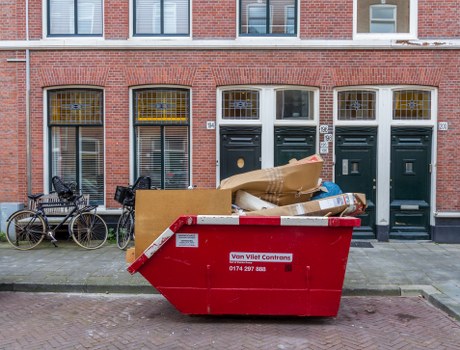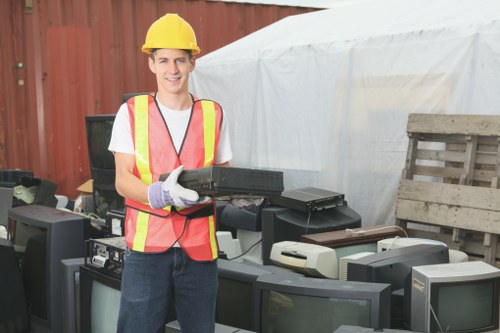Comprehensive Guide to Council Rubbish Collection in Sidcup

Managing household waste is a crucial responsibility for every resident in Sidcup. Council rubbish collection services play a significant role in maintaining the cleanliness and hygiene of the community. Understanding how these services work, the types of waste collected, and the schedules can help residents effectively manage their rubbish disposal.
Sidcup, located in the London Borough of Bexley, has a well-organized rubbish collection system. The council provides various services, including general waste, recycling, and bulky waste collection. Each service has specific guidelines to ensure efficient waste management.
Residents are encouraged to segregate their waste to promote recycling and reduce landfill use. Proper segregation not only helps the environment but also ensures that recyclable materials are processed correctly.
Rubbish Collection Schedule

Understanding your rubbish collection schedule is essential to avoid missed pickups or fines. Sidcup council provides a clear timetable indicating the days allocated for different types of waste.
Typically, general waste is collected once a week, while recycling services might be available on alternate weeks. Bulky waste collection usually requires booking in advance and is not part of the regular schedule.
Residents can access their specific collection dates through the council’s website or by contacting the local council office. Keeping track of these dates ensures timely disposal of waste.
Types of Waste Collected

Sidcup council categorizes waste into several types to streamline the collection and recycling processes. The primary categories include:
- General Waste: Non-recyclable household waste.
- Recycling: Materials such as paper, plastic, glass, and metals.
- Bulky Waste: Large items like furniture and appliances.
- Garden Waste: Organic waste from gardens.
Each category has specific guidelines on how items should be prepared and placed for collection. Following these guidelines helps ensure efficient processing and reduces the chances of items being rejected.
For example, recyclables should be clean and dry, free from food residue. Bulky waste items often need to be placed at the designated collection point on the scheduled day.
Recycling Initiatives in Sidcup

Recycling is a key component of Sidcup’s waste management strategy. The council promotes various recycling initiatives to encourage residents to participate actively.
These initiatives include providing separate bins for recyclable materials, organizing community recycling drives, and offering educational programs about the importance of recycling.
By actively engaging the community, Sidcup aims to increase recycling rates and reduce the environmental impact of waste. Proper recycling helps conserve resources and minimizes the amount of waste sent to landfills.
Bulky Waste Collection Services

Handling bulky waste can be challenging, but Sidcup council offers dedicated services to assist residents. Bulky waste items include large furniture, appliances, and other sizeable household items that do not fit into regular bins.
Residents can book a bulky waste collection through the council’s online portal or by calling the local office. It’s advisable to schedule these collections in advance to ensure timely pickup.
Properly disposing of bulky waste helps keep the community clean and prevents large items from littering the streets. The council ensures that bulky waste is either recycled or disposed of responsibly.
Household Waste Management Tips
Effective waste management starts at home. Here are some tips for Sidcup residents to manage their household waste efficiently:
- Sort Your Waste: Separate recyclables from general waste.
- Reduce Waste: Minimize the use of single-use plastics and opt for reusable products.
- Compost: Use composting for organic kitchen and garden waste.
- Proper Disposal: Follow the council’s guidelines for disposing of hazardous or bulky waste.
- Stay Informed: Keep up with the latest waste management policies and schedules from the council.
Implementing these practices not only helps the environment but also makes the rubbish collection process smoother and more efficient.
Engaging the entire household in waste management efforts can significantly enhance the effectiveness of these initiatives.
Recycling Centers in Sidcup
In addition to regular collection services, Sidcup council operates several recycling centers where residents can drop off specific types of waste. These centers accept materials that cannot be collected curbside or require special handling.
Recycling centers typically accept items such as electronics, batteries, and hazardous materials. They provide a convenient option for residents to dispose of items responsibly, ensuring that these materials are processed correctly.
Visiting a recycling center helps reduce the burden on regular collection services and promotes community involvement in waste management.
Hazardous Waste Disposal
Hazardous waste requires careful handling and disposal to prevent environmental contamination. Sidcup council provides specific services for hazardous waste, ensuring that these materials are managed safely.
Common hazardous wastes include chemicals, paints, batteries, and electronic waste. Residents must follow the council’s guidelines for disposing of these items, which often involve taking them to designated collection points or recycling centers.
Proper disposal of hazardous waste is crucial for protecting public health and the environment. The council’s services ensure that these materials are treated and disposed of in a manner that minimizes their impact.
Cost and Payment for Rubbish Collection
Understanding the costs associated with rubbish collection services is important for budgeting and compliance. Sidcup council provides information on any fees related to waste disposal and recycling services.
Generally, basic rubbish collection is included in the council tax, but additional services like bulky waste collection may incur extra charges. The council offers detailed information on these costs, ensuring transparency for residents.
Residents can find payment options and any applicable discounts or exemptions on the council’s official website or by contacting the local office directly.
Environmental Impact of Rubbish Collection
Effective rubbish collection has a significant positive impact on the environment. By managing waste properly, Sidcup council helps reduce pollution, conserve resources, and protect natural habitats.
Recycling initiatives decrease the need for raw materials, saving energy and reducing greenhouse gas emissions. Proper waste disposal prevents harmful substances from contaminating soil and water sources.
Community participation in waste management efforts amplifies these environmental benefits, contributing to a sustainable and healthy environment for future generations.
How to Report Missed or Irregular Collections
Occasionally, residents may experience missed or irregular rubbish collections. Sidcup council has procedures in place to address these issues promptly.
To report a missed collection, residents can contact the council through their online portal, phone, or email. Providing detailed information, such as the address and type of waste not collected, helps the council resolve the issue efficiently.
The council strives to maintain a reliable rubbish collection service. Prompt reporting ensures that any disruptions are addressed swiftly, maintaining the cleanliness and hygiene of the community.
Volunteer and Community Programs
Sidcup council encourages community involvement in waste management through various volunteer and community programs. These initiatives aim to raise awareness and promote sustainable practices among residents.
Programs include neighborhood clean-up events, recycling workshops, and educational seminars on waste reduction. Participating in these activities helps build a stronger, more environmentally conscious community.
Volunteering for such programs not only benefits the environment but also fosters a sense of community and shared responsibility among residents.
10 Nearby Areas to Sidcup and Their Rubbish Collection Features
Sidcup is surrounded by several areas, each with its unique rubbish collection features. Understanding the waste management services in these nearby areas can help residents coordinate waste disposal effectively.
- Welling: Located just north of Sidcup, Welling offers similar rubbish collection services with weekly pickups and recycling options.
- Erith: To the east, Erith provides comprehensive waste management, including bulky waste collection on scheduled days.
- Crayford: Adjacent to Sidcup, Crayford has an efficient recycling program and frequent general waste collections.
- Bexleyheath: South of Sidcup, Bexleyheath offers specialized services for hazardous waste disposal.
- Chislehurst: Known for its community recycling centers, Chislehurst supports Sidcup residents in managing their waste.
- Leyton: West of Sidcup, Leyton has robust waste collection schedules and environmental programs.
- Thurrock: A bit further northeast, Thurrock provides distinct bulky and general waste services.
- Dulwich: Not to be confused with the London area, Dulwich near Sidcup offers efficient rubbish collection and recycling.
- Lee: Southeast of Sidcup, Lee has regular waste pickups and community recycling initiatives.
- Shortlands: Close to Sidcup, Shortlands features easy access to recycling centers and reliable waste collection.
- Elmstead: With a focus on sustainability, Elmstead supports Sidcup with eco-friendly waste management options.
- Barnehurst: Barnehurst provides comprehensive waste services, including seasonal collection for garden waste.
- Hurst Green: This area offers flexible rubbish collection schedules and participation in council recycling programs.
- Kilmuir: Kilmuir emphasizes household waste reduction, collaborating with Sidcup for efficient rubbish collection.
- Welling Green: Welling Green enhances Sidcup’s waste management with additional recycling pick-up points.
Each of these areas enhances the overall waste management system in and around Sidcup, ensuring that all residents have access to reliable and efficient rubbish collection services.
Future Developments in Rubbish Collection
Sidcup council is continuously looking to improve its rubbish collection services. Future developments focus on increasing recycling rates, reducing landfill use, and adopting sustainable waste management practices.
Plans include introducing more recycling centers, expanding bulky waste collection services, and implementing advanced waste sorting technologies. These developments aim to make rubbish collection more efficient and environmentally friendly.
Residents can stay informed about these changes by following council announcements and participating in community meetings. Active engagement ensures that the waste management system evolves to meet the community’s needs effectively.
Conclusion
Council rubbish collection in Sidcup is a well-structured system designed to manage waste effectively and sustainably. By understanding the schedules, types of waste collected, and available services, residents can contribute to a cleaner and healthier environment.
Engaging in recycling initiatives, properly segregating waste, and utilizing bulky waste services are essential practices for effective waste management. Additionally, being aware of services in nearby areas ensures comprehensive coverage and support.
Sidcup council’s commitment to improving rubbish collection services reflects its dedication to environmental sustainability and community well-being. Residents play a crucial role in this effort by adhering to guidelines and participating in waste management programs.
Frequently Asked Questions
- How often is general waste collected in Sidcup?
General waste in Sidcup is typically collected once a week. Residents can check their specific collection days on the council’s website or contact the local office for more information.
- What items are accepted in Sidcup’s recycling program?
Sidcup’s recycling program accepts materials such as paper, cardboard, plastics, glass, and metals. It’s important to ensure that recyclables are clean and dry before placing them in the recycling bin.
- How do I book a bulky waste collection in Sidcup?
Residents can book a bulky waste collection by visiting the council’s online portal or calling the local council office. It’s recommended to schedule these collections in advance to secure a pickup date.
- Are there any fees for rubbish collection in Sidcup?
Basic rubbish collection is included in the council tax. However, additional services like bulky waste collection may incur extra charges. Detailed information on costs can be found on the council’s official website.
- Where can I dispose of hazardous waste in Sidcup?
Hazardous waste can be disposed of at designated recycling centers operated by Sidcup council. Residents should follow the council’s guidelines for safe disposal of hazardous materials.